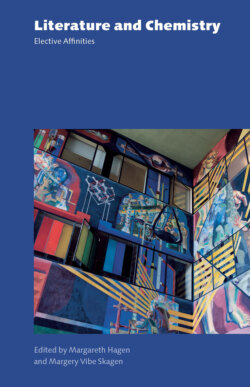Читать книгу Literature and Chemistry - Группа авторов - Страница 12
На сайте Литреса книга снята с продажи.
EARTH, AIR, FIRE, AND WATER VERSUS THE PERIODIC TABLE
ОглавлениеAs a hybrid science, located between technology and theory, and between observation and experiment, chemistry can be said to share with literature not only fundamental processes of creation but also epistemological problems of representation. More than other sciences, chemistry stands in an analogical relation to literature. This claim can also be made for contemporary, theoretical chemistry with its extreme conceptual objectivity and abstraction, compared to the rich mythological and symbolic connotations conveyed by the verses and narratives of alchemy. A modern chemical symbol or diagram speaks a different language from an alchemical allegory. Still, Primo Levi recalls that when he was a young student, Mendeleev’s periodic table seemed poetry “loftier and more solemn than all the poetry we had swallowed down in the liceo, and come to think of it, it even rhymed!” (Levi, p. 41).15 T. S. Eliot also uses the precise vocabulary of modern chemistry – gazes, catalysts, platinum, sulphurous acid … – to metaphorise processes in the poet’s mind, describing it as “a receptacle for seizing and storing up numberless feelings, phrases, images, which remains there until all the particles which can unite to form a new compound are present together”(Eliot, p. 155).16
The semiotics of the language of chemistry – with its molecular models, symbols, formulas, its historically and sometimes mythologically rooted terminology, the common names of the substances and elements, and the IUPAC nomenclature17 – is particularly interesting, being simultaneously iconic, in the form of molecular models, and symbolic. The history of alchemical and chemical nomenclature also attracts scholars of conceptual history. In one of her articles on the philosophy of chemistry, Bernadette Bensuade-Vincent stresses how identifying, naming, and classifying are the principal obligations of chemists. An enormous number of new molecules are reported each year, demanding a name and a place in the databases, while the IUPAC is continuously revising the rules of chemical nomenclature (Bensuade-Vincent, p. 172).
The French chemist Marcellin Berthelot (1827-1907) stated that, like literature and art, chemistry creates its object, and that the creative faculty forms an essential distinction between chemistry and the other natural or historical sciences. This specificity of chemistry – the art and craft of substances and their transformation, the work of hands and mind combined – is concretised by Roald Hoffmann in his article “What Might Philosophy of Science Look like if Chemists Built It?”. The chemist, playwright, and essayist discusses why philosophers of science do not emphasise construction, experiment, and invention (Hoffmann, p. 33). Chemistry is different because its observations are not passive: today it relies on creation rather than discovery. Its craft of synthesis does not fit into the Popperian conjecture/refutation process. Many chemical papers do not test theories; the construction of matter, molecules and so on is narrated; and chemical explanations are also often based on narrative.
Considering all these affinities, one may wonder why the enlightened public’s and poets’ “chemical” approach to reality is so often outdated from a scientific point of view. Why does Tarkovskii’s Nostalgia – the characters’ trials of initiation through fire and water – move us precisely by its lingering celebration of the traditional elements? Literature does not age in the same way as science, and neither do its topics and thought structures. For the philosopher of science Gaston Bachelard (1884-1962), the intersection between the imaginary and the natural world may be understood not through the elements of the periodic table, but through the primal, material symbols of earth, fire, water, and air. Whether we believe in the material imagination’s ontological or merely psychological status, urbanised Westerners still confirm their nostalgia for a truly synecdochic relation to the natural world by cultivating vacation rituals of open air, earth, water, and fire, or by regenerating their sense of belonging to elemental reality through imaginative reading. Bachelard explored rêverie and persistent, subjective intuitions about the elements in order to uncover the subconscious of scientific objectivity. Literary scholars can practise a similar “auto-critical irony” and discover some of their assumptions, blind spots, and core beliefs by measuring themselves against science.
